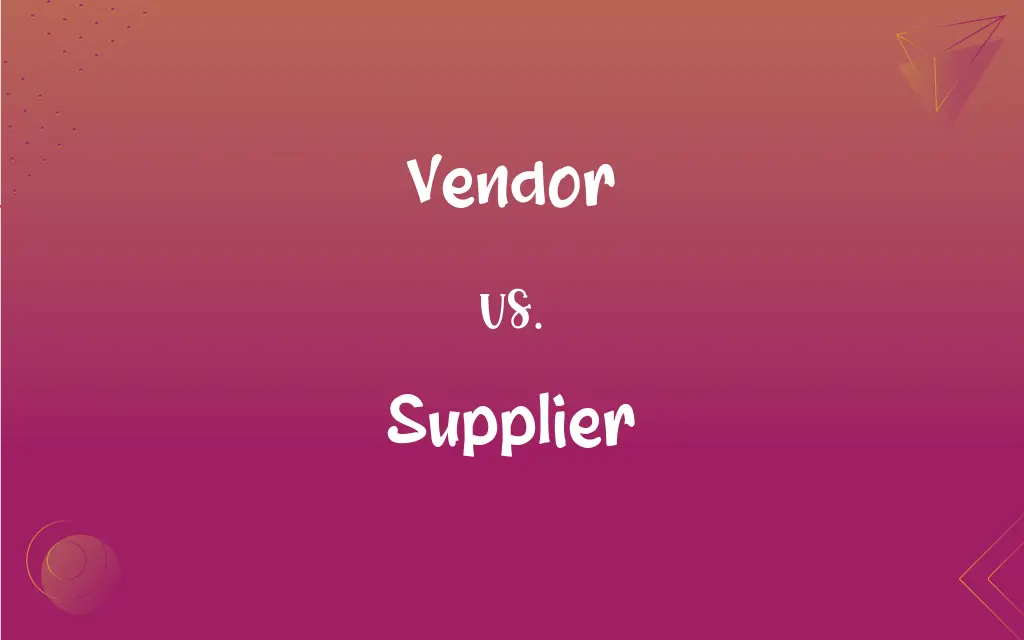Vendor vs. Supplier: What's the Difference?
Edited by Janet White || By Harlon Moss || Updated on October 4, 2023
A vendor sells goods or services directly to consumers, while a supplier provides goods or services to a business or vendor for resale or business operations.

Key Differences
When observing the roles of vendor and supplier, it's pivotal to understand their primary functions. A vendor typically sells products directly to the public or end consumers. Conversely, a supplier furnishes products or services, often to businesses or vendors, to facilitate their operational needs or for resale.
The environments in which a vendor and supplier operate can often differ. Vendors can be seen in retail environments, online platforms, or marketplaces engaging directly with consumers. Suppliers, on the other hand, commonly have a B2B (Business-to-Business) relationship, providing raw materials, finished goods, or services to other businesses.
Considering the scale and reach, vendors generally have a more localized or niche focus, targeting specific consumer markets or geographic areas. Suppliers can operate on a broader scale, sometimes even globally, catering to multiple businesses, industries, or vendors.
The relationship dynamics between the two can be interconnected. In many scenarios, a vendor might rely on multiple suppliers to source the products they sell. Conversely, a supplier might cater to multiple vendors, ensuring they have the products or services needed for their business operations.
From a financial perspective, vendors interact directly with consumers and handle transactions based on retail pricing. Suppliers deal with wholesale or bulk pricing, given the larger quantities typically involved in their transactions with businesses or vendors.
ADVERTISEMENT
Comparison Chart
Primary Function
Sells to end consumers
Provides to businesses or vendors
Operating Environment
Retail, online, direct consumer markets
Business-to-business (B2B) environments
Scale and Reach
More localized or niche
Broader, sometimes global
Relationship Dynamics
Relies on suppliers
Serves multiple vendors or businesses
Financial Interaction
Deals with retail pricing
Engages in wholesale or bulk pricing
ADVERTISEMENT
Vendor and Supplier Definitions
Vendor
An entity selling products or services to end consumers.
The vendor at the farmers' market had the freshest produce.
Supplier
An entity providing goods or services for business operations.
The manufacturer chose a new supplier for raw materials.
Vendor
A seller in a specific market or platform.
She became a top vendor on the e-commerce website.
Supplier
A provider of resources or commodities to businesses.
The company's main supplier of software went bankrupt.
Vendor
A business that deals directly with the public.
The ice cream vendor was popular among the children.
Supplier
A company that delivers products or services to another business.
As a major steel supplier, they catered to various industries.
Vendor
An individual or company offering goods for sale.
The art vendor showcased unique paintings at the fair.
Supplier
A source from which retailers or vendors procure products.
The bookshop sourced rare editions from a trusted supplier.
Vendor
A retailer or merchant in a specific domain.
The software vendor offered a comprehensive solution for businesses.
Supplier
An entity in a B2B relationship offering wholesale goods.
The restaurant found a new supplier for organic ingredients.
Vendor
One that sells or vends something
A street vendor.
A vendor of software products on the Web.
Supplier
To make available for use; provide
Does the hotel supply towels?.
Vendor
One that provides products or services to a business for a fee.
Supplier
To provide something necessary or desired to; furnish or equip
Supplied the players with uniforms.
Vendor
A vending machine.
Supplier
To have as a necessary or desirable feature
A crime scene that supplied valuable evidence.
Supplier
To fill sufficiently; satisfy
Supply a need.
FAQs
What's the main role of a vendor?
A vendor primarily sells products or services directly to end consumers.
Who engages more with the end consumer?
Vendors engage directly with end consumers.
Can a vendor also be a supplier?
Yes, if they provide products or services to other businesses, they can be considered suppliers.
Which one typically deals with bulk or wholesale transactions?
Suppliers usually deal with wholesale or bulk transactions.
How do vendors source their products?
Vendors source their products from manufacturers, wholesalers, or suppliers.
Is a manufacturer a supplier?
Yes, manufacturers can be suppliers if they provide products to other businesses or vendors.
What does a supplier typically provide?
A supplier offers goods or services to businesses, often for resale or operational needs.
In what environment is a vendor commonly found?
Vendors are commonly found in retail environments, online platforms, or direct marketplaces.
Who usually operates on a larger scale?
Suppliers often operate on a broader, sometimes global, scale.
Can a business have multiple suppliers?
Yes, many businesses source from multiple suppliers for diverse needs.
Can a vendor operate online?
Absolutely, many vendors operate online platforms or e-commerce websites.
Is a wholesaler a vendor or a supplier?
A wholesaler typically acts as a supplier, providing products to retailers or vendors for resale.
How do suppliers and vendors relate in the supply chain?
Suppliers provide products to vendors, who then sell them to end consumers.
Who generally has a more niche market focus?
Vendors often have a more localized or niche market focus.
Do suppliers sell to the general public?
Typically, suppliers sell to businesses, but some may also offer products to the general public.
Can one company be both a vendor and a supplier?
Yes, a company can act as both if it sells products to consumers and supplies goods to other businesses.
Which typically requires more extensive logistics?
Suppliers, given their broader reach and scale, often require more extensive logistics.
What type of pricing do vendors usually handle?
Vendors typically deal with retail pricing.
Who generally offers bulk discounts?
Suppliers often provide bulk discounts due to the large quantities involved.
In a B2B model, which term is more applicable?
In a B2B model, the term "supplier" is more commonly used.
About Author
Written by
Harlon MossHarlon is a seasoned quality moderator and accomplished content writer for Difference Wiki. An alumnus of the prestigious University of California, he earned his degree in Computer Science. Leveraging his academic background, Harlon brings a meticulous and informed perspective to his work, ensuring content accuracy and excellence.
Edited by
Janet WhiteJanet White has been an esteemed writer and blogger for Difference Wiki. Holding a Master's degree in Science and Medical Journalism from the prestigious Boston University, she has consistently demonstrated her expertise and passion for her field. When she's not immersed in her work, Janet relishes her time exercising, delving into a good book, and cherishing moments with friends and family.































































